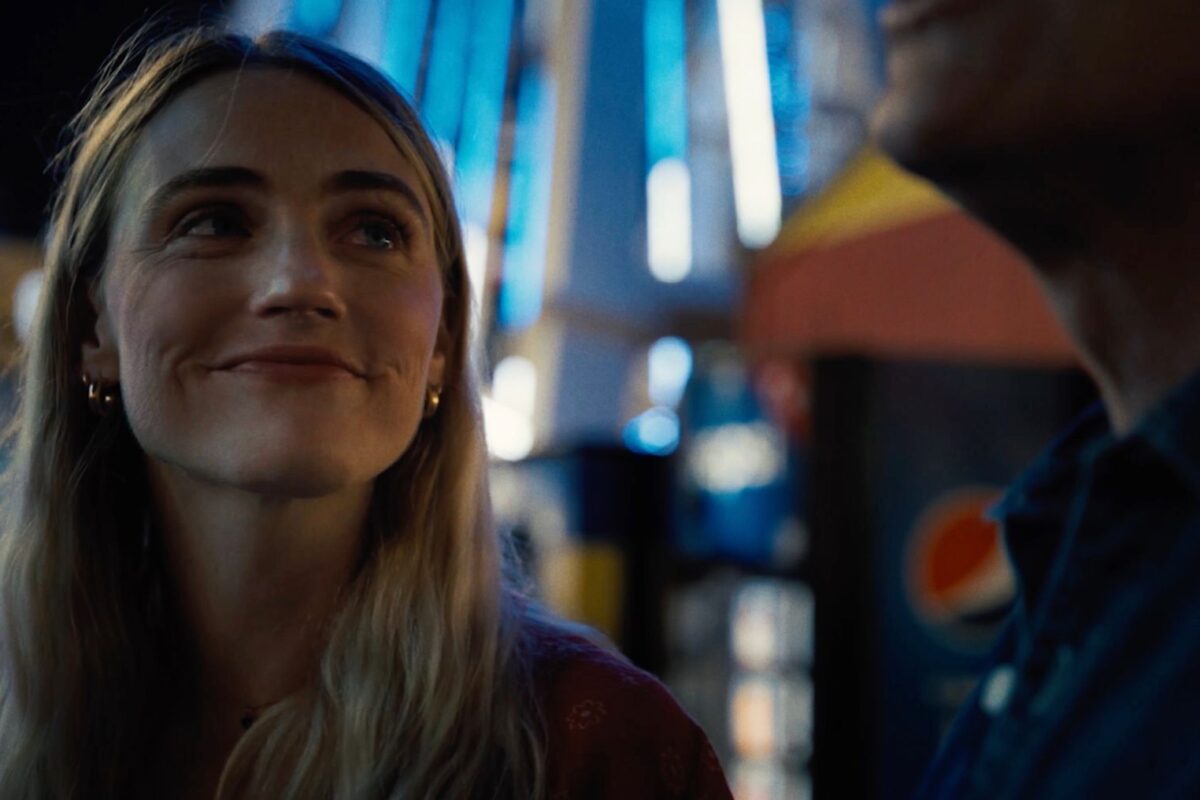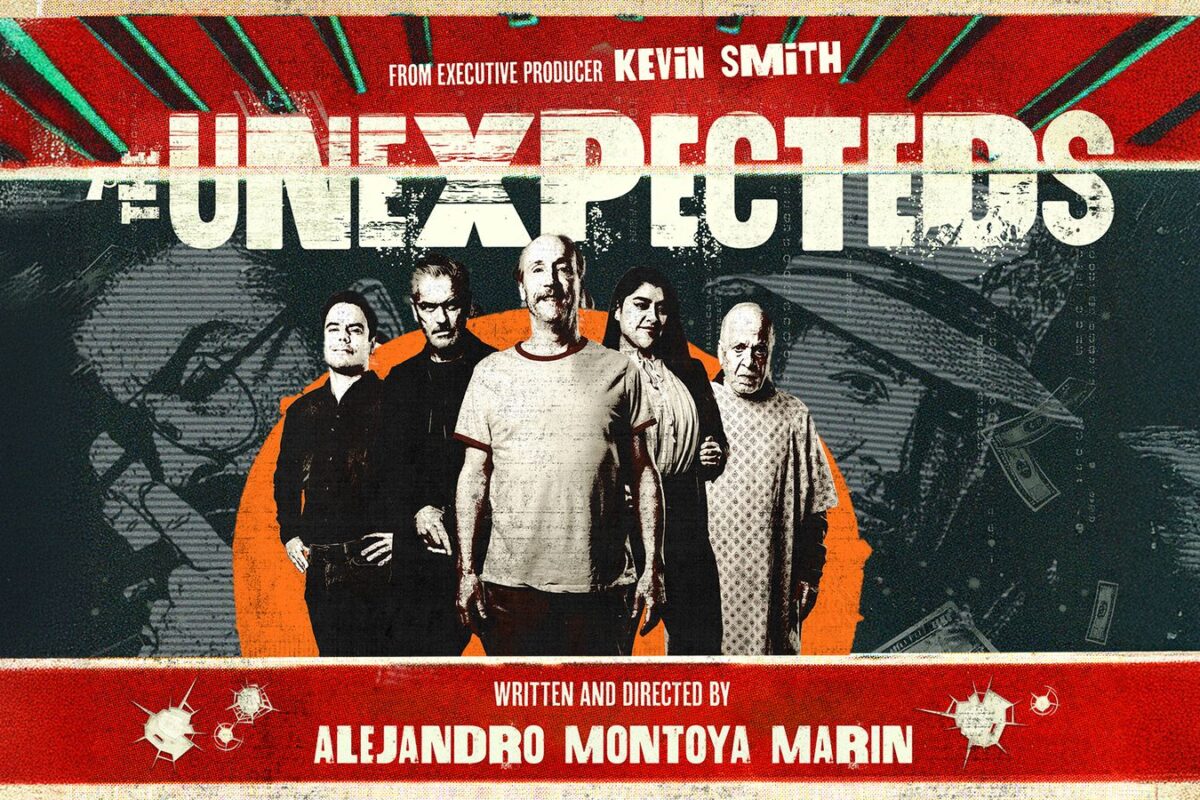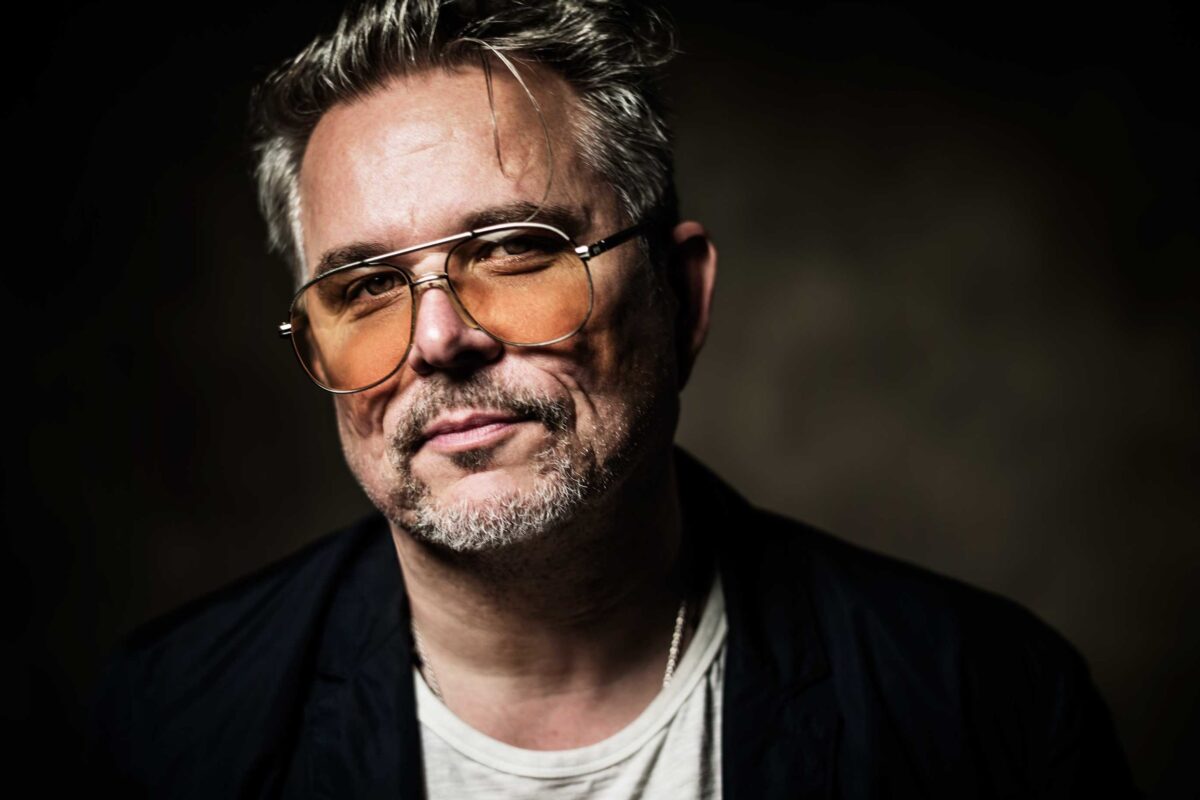
Director John Hsu, whose breakout horror thriller Detention in 2019 brought a fresh look at genre-blending storytelling. With Dead Talents Society he does it again this time bringing in some humor to tell this prescient story of being seen. The Cine-Men’s Brian Taylor sat down with him at this years Fantastic Fest to talk about his latest film.
Brian: So, I have a few questions. I really loved your film; it’s great. What I really liked about it is that it really seemed to have a kind of perfect balance of comedy and horror. How did you balance that?
John Hsu: I’m always kind of like a comedy guy, besides my first feature being a horror film, but that was actually because I’ve been a gamer since I was a kid and my first feature, Detention, is an adaptation from a video game and I loved that game a lot. It’s kind of the only force that was driving me to go through that horror film production.
I like watching horror films, but I’m not a big fan of making one. I don’t consider myself someone who is really capable of scaring people. And that’s where the jokes are coming from because I think I’m lacking the ability. I know some filmmakers really enjoy scaring people, it’s like their thing and this is totally not my thing. So when we were making Detention, there were several things you needed to do, some kind of a jump scare or something. And the whole process was actually serious; it was actually hilarious. But since it’s a serious movie, we’re all trying to laugh, but we can’t laugh for the whole time. So that kind of mixed feeling of you wanna make fun of something serious, but not able to do that, it all comes to Dead Talents Society. And, to me, the balance between horror and comedy, I think the two genres are actually quite similar.
Brian: You’re right, it’s timing.
John: It’s all about building some kind of expectation and then subverting it when they least expect it. So, that’s why I think that a lot of really good horror films, coming from comedian directors like Jordan Peele. And, like me, I’m always playing with comedy; I’m always making comedy short films and VR projects, stuff like that. The balance between the two is actually quite natural to me.
Brian: It’s done real well in this film. Speaking of the story, how did you come up with it? Where did it come from?
John: There was a back story to it from several years ago after I finished my first feature, Detention. I watched a horror film, it was a Taiwanese film, I forgot the title, and I don’t usually watch that kind of traditional horror film, especially those that are imitations of classic horror films. We have a bunch of them in Taiwan, every year they’re like four or five, most of them are not that good. I was invited to one of the premier events, so you had to go, but you know it’s not going to be good. I was watching the whole film, not feeling anything, while the audience was screaming and yelling for the whole time. So I always feel like I’m out of place. I remember there’s one scene in the movie, the female was crawling in a public toilet, which is super dirty, and she’s crawling on the floor and covered with shit and dirt and blood and she’s doing that scary face. You can see that she’s actually trying so hard but I’m not that kind of person who’s easily scared, so I’m kind of immune to that. So, it’s kind of become some kind of a fruitless effort to make it scary.
Brian: I feel you.
John: So, I was just sitting in the audience and felt sorry for the ghost and I was like, oh my god, she’s really trying hard, I really want her to stop, really want her to take some rest and stop scaring me like that, not as an actor, but as a ghost. And that gave me the idea that if we make those ghost scaring people as a job, it might be one of the most shittiest jobs ever.
Brian: Yeah, It did look like it. I’m curious, how much does current social media influence the film?
John: After the initial inspiration, we start trying to do some research, but you cannot interview ghosts or anything. Then we have this quick connection, like inspiration coming from the other side, which is like if ghosts are competing with each other, like influences, or actor and actress. So, we started to interview a bunch of influencers and watch a bunch of documentaries about influencer culture. And I think that’s actually kind of similar, because the whole Youtube culture is exactly about how you need to be seen to exist. Because I remember there was one documentary, the Taiwanese documentary, and it’s talking about that there are a bunch of different kinds of Youtubers, some of them are very famous, and some of them only got like 60 subscribers or something. I kind of feel that the one who has only like six people following them is like a ghost, like they don’t exist. They’re actually doing really nice things, but if there’s only 60 people watching you, then you’re nonexistent. And I remember there was a saying in that documentary, they put a really popular one and the really shitty one together and they have a co-interview with each other and you can totally see that the one who’s got really popular doesn’t give a shit about the other one. So, that kind of culture is like an exaggerated version of Hollywood and that gave us the idea to put the two things together. We have the old Hollywood style stars competing with each other, and then we have this new generation who don’t really give a shit about the previous generation. So, it’s kind of like how these different characters would develop.
Brian: I actually really like that. Actually, it leads into my next question, because for me, there was that theme that ran throughout the film, that there’s a pressure for success, and not just a pressure for success, but just a pressure to succeed. What do you hope people take after you film?
John: After my first feature, Detention, that box office success in Taiwan was a little bit overwhelming to me, because that was my first feature. I don’t think I knew what I did, so I kind of suffer from this kind of impostor syndrome, and that’s where the leading character is experiencing throughout the film, because she always considers herself as someone with zero talent, and suddenly she sings. So, it’s like everyone treated her like she’s the best and I think that’s kind of a semi-autobiography to me, to develop this character and also the storyline. We started digging deeper into that story, to see if there are any references of books talking about that and then we got deep into the existentialism field. I remember me and my co-writer [Kun-Lin Tsai] were reading the book Charon, the myth of Sisyphus, like you are doing something you know is meaningless, but you have to do it over and over again. You’re either being seen or not, or you either succeed or fail; but no matter what, it’s still going on, it’s something you cannot escape from, which can be terrifying.
Brian: It is. If you think about it, it has a perfect place in a horror movie.
John: If you’re one of the ghosts, you kind of need to do it forever; just stay existing.
Brian: Just stay seen. So, you co-wrote the script and you directed it, so what was the hardest part to write?
John: I think this is one of the works that I kind of take myself out the most. Like what I’ve said, I’ve been through there; I’ve been to the best part of the industry, and also the worst part of it. So to me, it’s really like telling my own story for the first time; to telling a story that has so much connection to myself. I think the most difficult part is one of those world buildings, of course, but that world building needs to come with the theme we’re talking about. So it’s not just random and setting up rules or something, everything needs to have a meaning as a metaphor to what we’re trying to talk about. So, it can be extremely imaginative, but also, it needs to come from where I feel like is the most painful aspect as a filmmaker. So, at that kind of, like taking myself out process was like… (scoff).
Brian: What was the most difficult scene to shoot?
John: It’s kind of like everything was kind of difficult to shoot because I remember we shot the whole time in winter and it was a cold winter. I think it was like a hot spring town in Taiwan and a lot of people are getting there to get to the hot spring. We rented the actual Hot Spring Hotel, which got like, not that many customers. And the whole shooting was so cold, and they needed to dress up in a schoolgirls uniform. I remember that day, it was extremely hard and also quite touching. Everyone is dressed so little, and they’re super cold, and it’s raining, and the whole crew was shaking for the whole time. But after they started running, the whole crew started running after them; that was like one of the best experiences and the most difficult thing, I guess.
Brian: I don’t know how they actually film like that, where they make it look like it’s warm, but it’s actually really cold.
John: Yeah, and they look really happy. Actually, the whole process was so painful to shoot. (They both laugh)
Brian: I was like, “that’s acting.” How many days did you shoot?
John: I remember, it was like 48 days.
Brian: That’s a pretty good amount of time.
John: It’s about that average amount of days you can get in Taiwan.
Brian: Gingle Wang was great, you know, as the rookie. Can you talk about the casting, like how did you find everybody?
John: I pretty much know every one of them for, like, more than ten years. We’re really good friends. Some of them like Sandrine Pinna [Catherine] and I went to the same film school; I made a short film with her almost 20 years ago. We are always talking to each other, chatting with each other, saying that one day we’re going to make a feature together. And then she became really popular in Taiwan and China, and we never got that chance to work together after that. I kind of think that this character fits her the most because that she is actually that person, as Catherine, she’s a completely that kind of person. I think the only difference is that she’s actually not that uptight, but she can be extremely uptight if you don’t know her. So I kind of planned the character we wrote and their own characteristics to put it together. So it’s like every character is really similar to themselves, especially Gingle. I worked with her in my first feature, Detention, so we’ve known each other quite a while. And everyone always thought that she was kind of like the sunny girl, that’s super outgoing and smart, and knows what she wants, and is always smiling, laughing and likes to play around, joking around, but actually, I think that she also suffers from this impostor syndrome, as I do, when Detention became a huge success and by that time she was only 20 years old. So I think it was world changing for her, that everything suddenly changed, especially how people are, like seeing her, she suddenly became one of the biggest stars in Taiwan. So, that kind of existential crisis, I think it was quite serious to her as well. We talked about it a lot. When I started writing this character, the leading character, who has no name, I immediately thought of her, and asked her if she wanted to play someone who has zero talent and is super non -confident. I think that’s kind of the hidden part of her that people don’t get to see. So, it was quite natural as well for me to cast her as that character.
Brian: My first thought after I saw it was, this is a perfect love letter for all the misfits and losers of the world, that we just sit there and we don’t really know what we want to do in life and we kind of are invisible, at which goes along the whole unseen kind of thing and we just go along our lives, but we don’t stand out.
John: And actually, even if you have any kind of success, you can still feel that, because you still feel this pressure that you need to keep being seen. If one day you stop being seen, then you’re nothing again. To me, it’s like living in Hell. (laughs)
Brian: No, it is. (laughs) So, as you said, this is your second feature, you don’t have shorts, but what did you take away from Detention on this film. Like, what did you learn?
John: I kind of learned that I’m probably not a horror film guy, because making a horror film is really not my thing. It does require a lot of timing, you have to make sure the timing is right, you have to play with the audience and distract them with something that you want them to focus on and scare them from the other side. That kind of practice got me through Detention. And there were actually a lot of jokes from Dead Talents Society of something that we really wanted to joke about in Detention but never got to.
Brian: I’m curious, I know you said you’re not really into horror films, but what movies and filmmakers have influenced you? And even more, what filmmakers influenced you on this film?
John: I’m also a big fan of all kinds of movies so I pretty much watch everything. I grew up with drama movies and actually a lot of horror movies. I really like to watch horror films as an audience. So, there were a bunch of horror films that really scared me to death when I was a teenager or something. One of them is the original Ring and also the original Grudge. In terms of more recent, like every Ari Aster’s horror films, like both of the horror films are masterpieces to me. And I also really like Edgar Wright, I think that had a lot of influence on me when I’m making comedies. I really like the fast paced tempo, I always managed to pull it off. And I also really like Dan Harmon, I like everything he did.
Brian: Somebody outside wanted me to ask you about Perfect Blue.
John: I’m a super big fan of Satoshi Kon. And this is kind of like a direct homage to Perfect Blue, because I think they are talking about similar stuff. It’s like, how much are you willing to become, in terms of being seen? How much price are you willing to pay; to twist yourself to become someone who you never feel like you know yourself again, just to get popular?
Brian: Did you do a costume in this film for Perfect Blue?
John: Essentially, it was my costume designer’s idea and when I saw that she did that, because she knows I am a big fan of Satoshi Kon and was like, are you sure we’re gonna do that, like a direct reference to that. You sure and it’s okay? And I remember, she replied to me saying, “if you like it.” I do like it and then it became something like that. I’m a big fan of every one of his films. I remember he was probably one of my most favorite filmmakers. I remember I cried so hard when I heard about his passing away. It’s like I watched his film more than ten times.
Brian: Well, thank you for your time.
John: Thank you.



